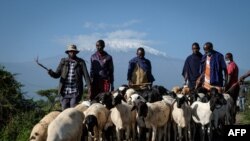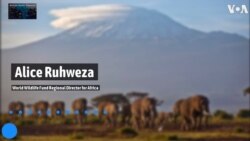Authorities at the World Wildlife Fund (WWF) Thursday released a report that said climate change has led to a global decline of wildlife and crops.
"It is an early warning indicator on the health of nature, and this year's edition has analyzed almost 32,000 populations of 5,230 species, with actually more than 830 new species and just over 11,000 added since the previous report came out in 2020," WWF’s regional director for Africa Alice Ruhweza told VOA.
The WWF report further said drought has intensified in Africa, which has threatened food security and livelihoods on the continent.
Authorities at the global wildlife institution added, drought has heavily impacted indigenous African communities such as Kenya’s Maasai community, who heavily rely on selling livestock for their livelihoods and have created a barter system with Tanzanian farmers.
The United Nations Environment Program (UNEP) says over 70% of people living in sub-Saharan Africa depend on forests and woodlands for their livelihoods and "indigenous people even more so because they live near these forests or near these parks and they actually access them for food," said Ruhweza.
Andrew Terry, the director of conservation and policy at the Zoological Society of London (ZSL) echoed the findings in the WWF report that focused on the impact of climate change on wildlife and crops.
Terry said there is a “serious drop” is wildlife globally and added, this “tells us that nature is unraveling, and the natural world is emptying.”
A recent report issued by the ZSL that focused on the status of 32,000 wildlife populations and covered more than 5,000 species said global wildlife has on average declined by 69%, and added, climate change, human exploitation, deforestation and pollution were the driving the declines.
The ZSL report further said wildlife populations in Latin America and the Caribbean experienced a 94% drop in five decades.
“One population of pink river dolphins in the Brazilian Amazon plummeted by 65% between 1994 and 2016,” read the ZSL report.
Mark Wright, the director of science at WWF-UK said the world is losing the war against climate change.
“The war is definitely being lost,” said Wright, adding, “Nature was in dire straits, and it is still in dire straits.”
Despite the reported decline in global wildlife, experts say the WWF report offers a glimmer of hope.
Experts say the eastern lowland gorilla population found in the Democratic Republic of Congo’s Kahuzi-Biega National Park dropped by 80% between 1994 and 2019 due to bushmeat hunting. But the population of mountain gorillas located near Virunga Park jumped from 400 in 2010 to over 600 by 2018.
Ruhweza called on rich nations to play an active role in conserving African wildlife.
“We are calling on the rich nations to provide support to us to protect our nature,” said Ruhweza.











